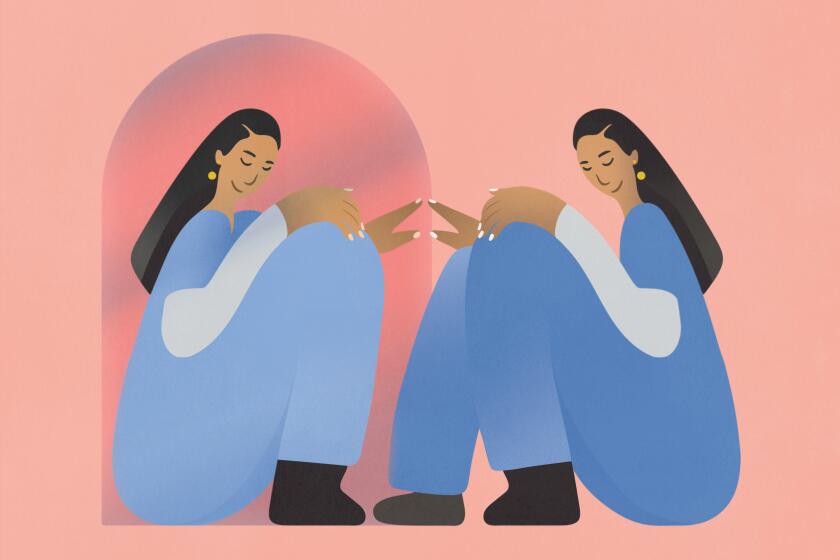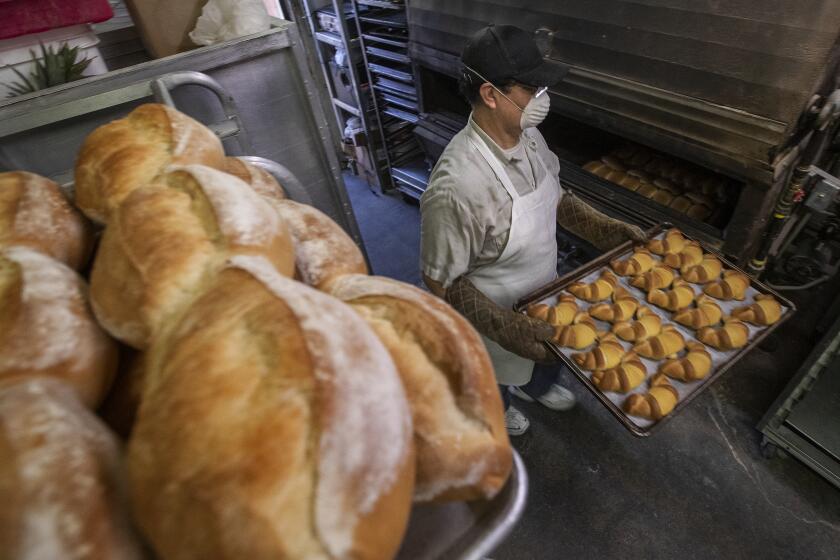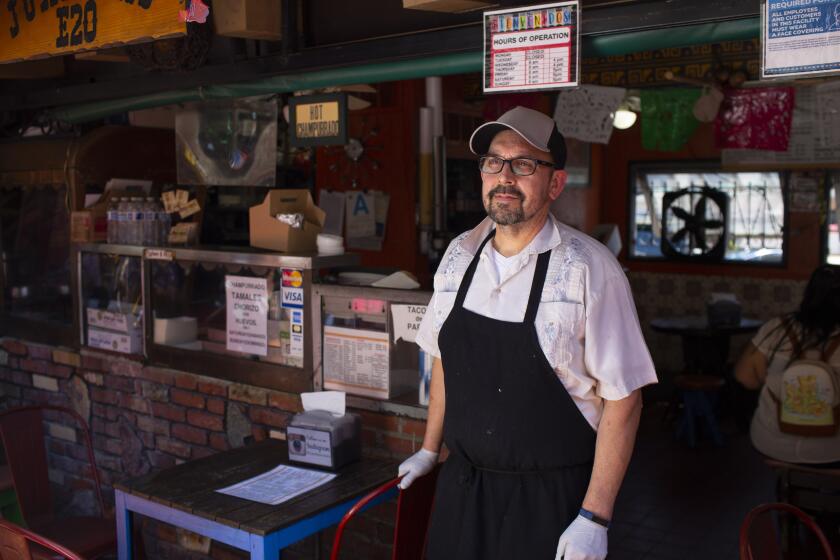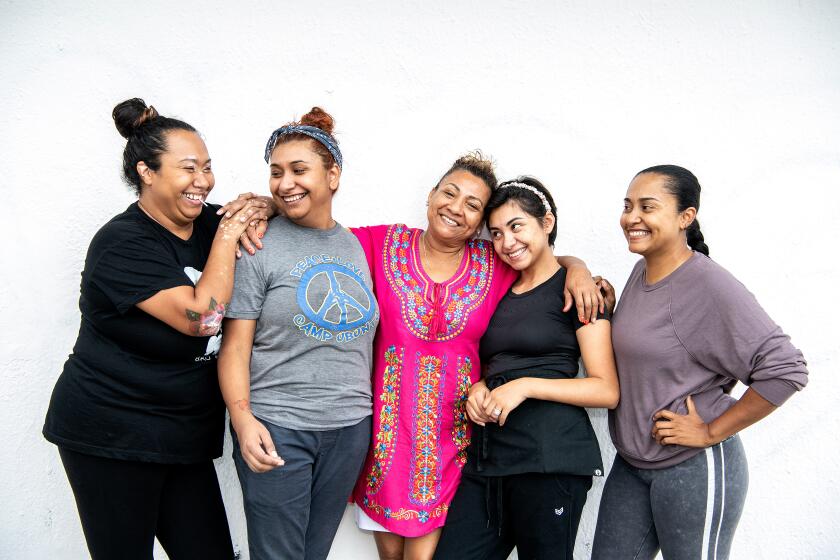- Share via
As she agonized over whether to quit her job, Ilianna Salas thought about her grandmother, who journeyed to California from a Mexican pueblo with nine children and no plan.
She thought about her mother, who never finished high school, and her father, who as a boy packaged sugar and rice to make a few pesos.
By hard work and maybe a few strokes of luck, they had made it into the American middle class.
Ilianna and her cousins, all college graduates, are the family’s pride, the fruits of their labor.
Then came the COVID-19 pandemic, which threatened to end the family clothing business, suddenly turning the promise into a mirage.
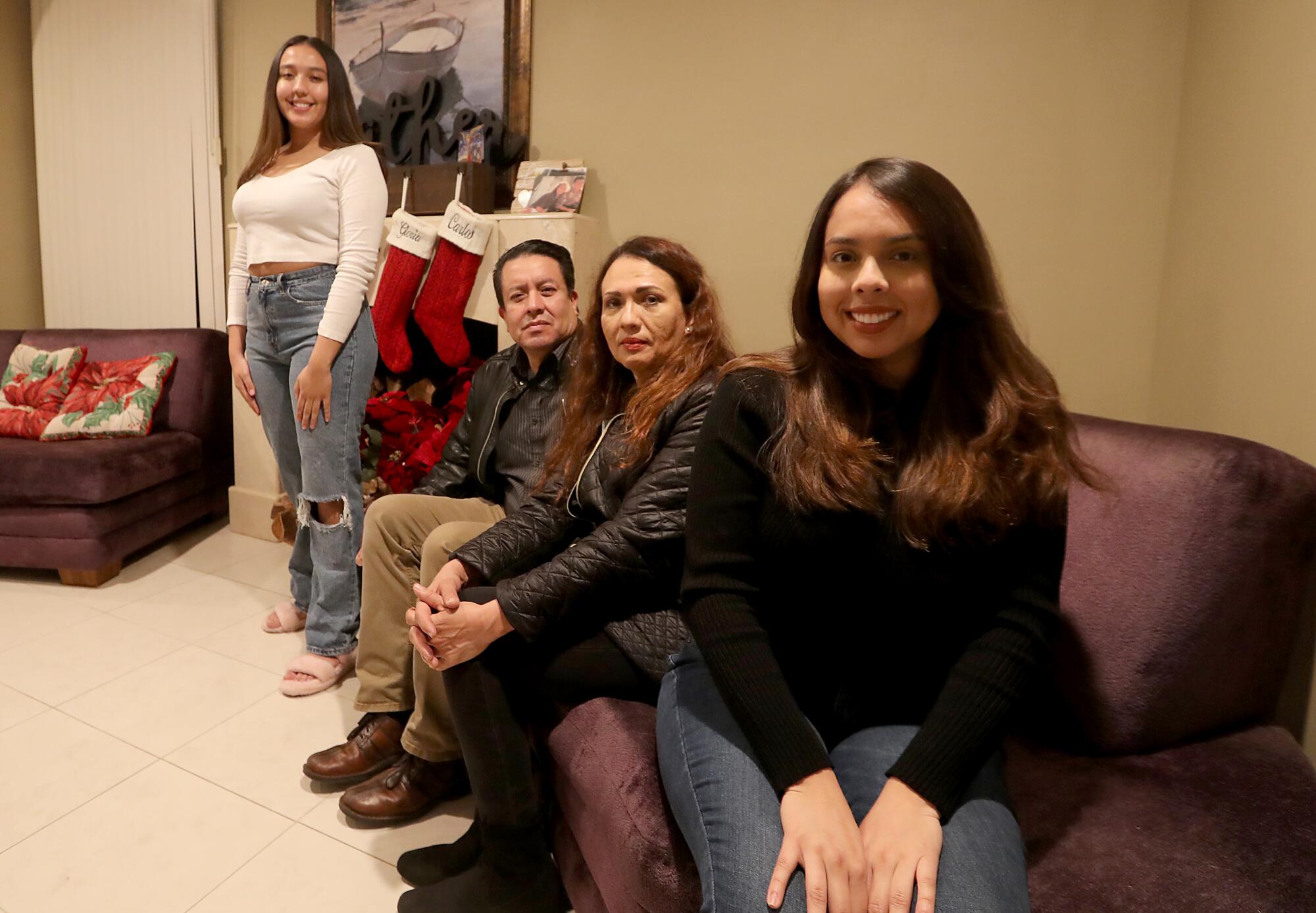
For the record:
6:57 a.m. Dec. 9, 2021A previous version of this article incorrectly referred to Cal Poly San Luis Obispo as Cal State San Luis Obispo.
Ilianna, 25, decided to take a risk — to leave the security of a marketing job at her alma mater, Cal Poly San Luis Obispo, and make her own way as an entrepreneur, in hopes of building greater generational wealth and securing her family’s future.
The pandemic has attacked Latinos with a particular ferocity. Its outsize effect on the middle class of the largest ethnic group in California has major implications for the state’s economy and future.
For families like Ilianna’s, who thought they had arrived, the pandemic also roused a deep sense of anxiety.
Ilianna doesn’t have to look far back to see the poverty her parents and grandparents endured. It lives in albums of grainy photos and in the stories told by her Abuela (Grandma) Rosa.
Before the pandemic, about 38% of the state’s Latino population fell into a middle-class income bracket — slightly less than the percentage of white people, according to a report by the California Latino Economic Institute.
But more than half of Latinos were in the lowest income bracket, and many in the middle class were at risk of slipping downward, said Mindy Romero, the report’s author.
According to the Pew Research Center, about 60% of Latinos said they or someone in their household had lost a job or experienced pay cuts in the months after the pandemic started, compared with 44% of the overall U.S. population.
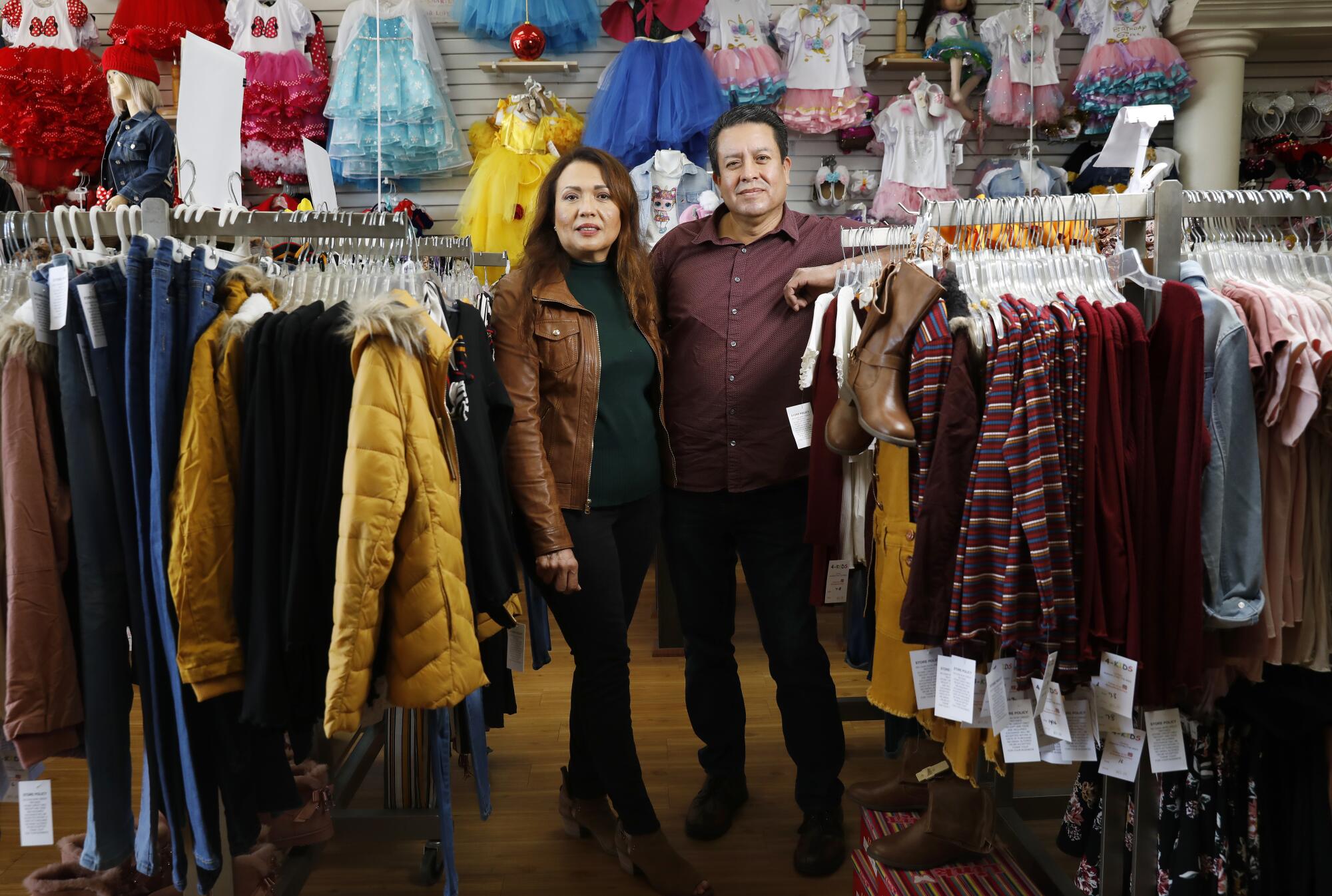
In the last decade, Latinos have built wealth at a faster rate than the overall population, increasing their slice of the pie in California, the world’s fifth-largest economy. If Latinos struggle, so does the state.
“If Latinos are left behind, that’s going to have a significant impact on California’s overall economy,” Romero said. “You can’t leave behind your most populous community.”
::
For Ilianna’s family, the long climb to the American dream started in the late 1970s in the Mexican state of Colima.
Rosa Cardenas and her children lived on a ranch near a beach abundant with mangoes and tropical greenery. Rosa’s life centered around her husband, a cattle farmer named Tobias Verduzco.
She rose when he did, setting down his breakfast and dinner before he came to the table.
Verduzco was quiet and didn’t interact much with the children, as far as his daughter Gloria Verduzco recalled. But he had a sweet tooth and on his way home would buy his children a packet of Galletas Maria, a popular Mexican brand of cookies.
Gloria had seven sisters, one brother and no worries. That changed in 1976, when her father was murdered.
The story of his death is shrouded in mystery. Gloria’s sister, Ghia Verduzco, says it was the work of an uncle over a land dispute.
Detectives tried pinning his death on Rosa. The grieving widow had to defend herself before a judge.
With a few of her daughters beside her, she told him: “Your honor, look at these children I have to provide for. Do you think I would kill my husband?”
The judge let her go. She decided to flee, scared that her brother-in-law would come after her.
First, she sent her older daughters, including Gloria, across the border with an aunt. Ghia went later, with her mom.
In a new country where she didn’t know the language, Rosa turned to what she knew: sewing. She rented a two-bedroom home in Pacoima.
Soon, she started her own business. Sometimes, clients didn’t pay. Her first-grade education and limited English made it hard to advocate for herself.
Still, she scraped together enough to buy her first industrial sewing machine and eventually her first home, in a rough part of La Puente.
Rosa woke before the sun, putting buttered bolillos in the oven to warm. After school, the children would walk the short distance home, where Rosa met them and took them to her job at a clothing manufacturer.
Each was assigned a task. One would put the pieces of a garment together. Another might attach buttons.
Gloria doesn’t remember their mother teaching them how to sew. They must have taught themselves, watching her hands.
At home, they remember hiding under their beds as police helicopters thudded overhead. Gangs and drugs were rampant.
First generation trauma is an emerging term in the Latino community, with people talking about it on social media. Here’s how it affects children of immigrant parents.
They entertained themselves by thumbing through fashion magazines, admiring the ’80s and ’90s styles. On weekends, Rosa took them to yard sales in West Covina. They would drive down Hollenbeck Street, gazing at the beautiful homes.
Rosa never remarried, raising nine children almost entirely on her own.
Several of her daughters eventually opened their own clothing businesses. In their heyday, the family had as many as 10 retail stores. All but one of Rosa’s children bought homes in West Covina.
Most family members got green cards in the 1986 amnesty and eventually became U.S. citizens. Rosa, afraid of the citizenship exam, never did.
Her granddaughters, Ilianna and her sister Paulina, attended Catholic schools. They grew up in a beautifully landscaped four-bedroom home with palm trees and spacious front and back yards — just like the ones on the fancy street their mother, Gloria, had so admired as a child.
::
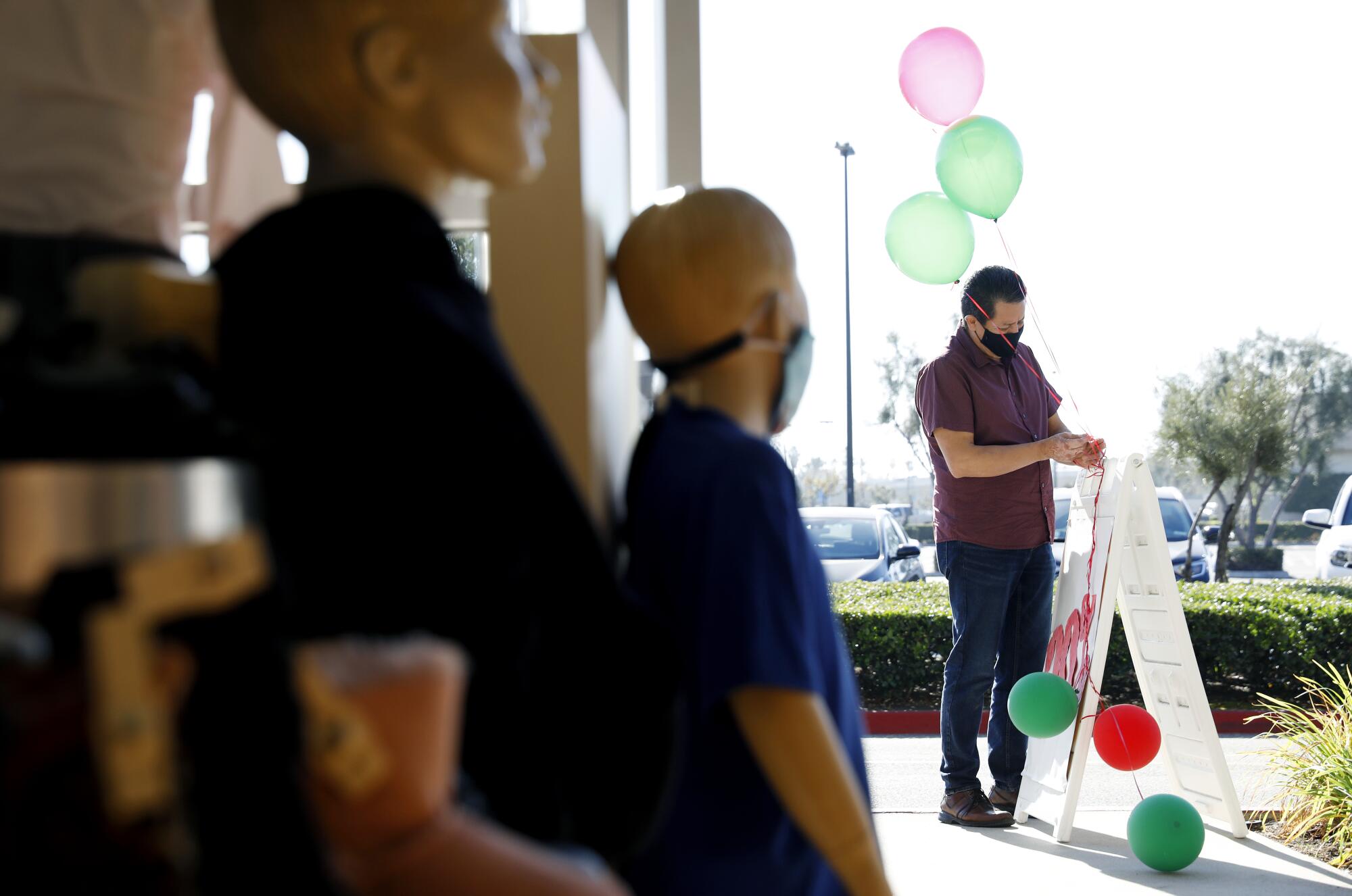
Rosa never deterred her children from pursuing education, but Gloria, wanting to help her mother, dropped out after 10th grade.
Gloria later teamed up with her future husband, Carlos, a shoemaker’s son who emigrated from Guanajuato, Mexico, as a teenager. They made clothes together and sold them at a Costa Mesa swap meet. Around 2000, they bought 4Kids Clothes.
It was the family’s only brick-and-mortar store to survive the 2008 recession and the rise of Amazon and other online stores.
Even with California on schedule to fully reopen in June, Whittier Boulevard business owners fear their customers will not return.
On a weekend before Christmas last year, amid a worsening COVID-19 surge, Gloria and Carlos shuffled from one end of the store to the other, posing mannequins and adjusting clothing as passersby, wearing masks, peered through the glass doors. Soon, customers were zigzagging through a labyrinth of narrow walkways between tightly organized racks of clothing.
“Hello, welcome,” Gloria greeted each customer, first in English and then, if she noticed no response, in Spanish. “Were you looking for something in particular? We have 30% off all shoes and casual wear.”
That busy weekend before the holidays was a far cry from the pandemic’s early days, when they had to shut down for months.
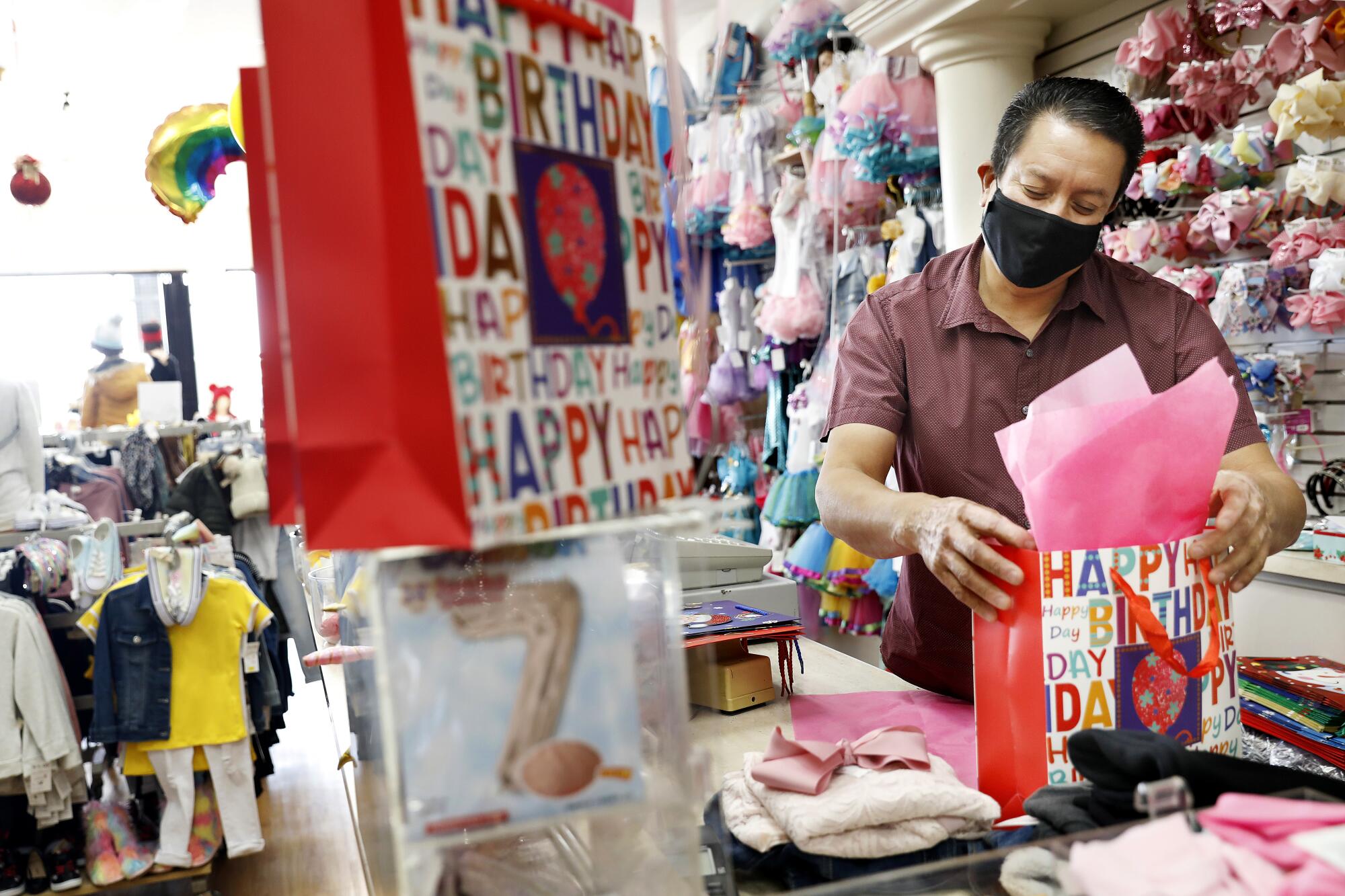
Carlos lost 20 pounds, and his blood pressure shot up. Gloria was close to giving up.
“I felt like we were going to lose everything. We were in a bad position,” Carlos said.
They owed three months in rent and had to dip into their savings.
“We said, OK, forget it. Just close up the store,” Gloria said.
Their daughters persuaded them to keep going.
In May, Ilianna pulled up the lease and pored over it. They hired an attorney to negotiate with their landlord, who had been demanding back rent.
“The pandemic has sobered me in many ways. If I really want to ‘make it’ in this society, I’m going to have to create my own path and create my own jobs for myself, because I don’t have a cushion.
— Ilianna Salas
Gloria and Carlos pivoted to making and selling masks. With their daughters’ help, they created a website and made some sales.
Still, in June, they were finished.
Just as they were loading merchandise into their SUV, ready to close for good, state officials announced that retail businesses could reopen on a limited basis.
Ilianna helped her parents apply for a federal Paycheck Protection Program loan. She watched webinars, reached out to the Small Business Administration and logged on to the Wells Fargo website “every single minute,” constantly refreshing.
A data analysis found businesses received PPP loans at higher rates in majority-white communities than in those in areas with Latino, Black or Asian majorities.
Wells Fargo rejected them, without giving a reason. Ilianna reapplied with a small bank. Eventually, they received about $17,000.
The virus spared them, at least. No one in their immediate family got sick.
::
The business Rosa started with a single sewing machine enabled her children to open their own stores, then her grandchildren to vault into the white
-
collar world.
The 30-plus members of the third generation are all college-educated or college-bound. They are business owners, graphic designers, music producers, engineers, nonprofit organizers and more.
Many worked at their parents’ stores growing up. Some viewed the menial tasks of running a business as a chore. Others felt joy and responsibility in the work.
They opened their hearts and wallets to help their parents open restaurants. Profiles of Tamales Elena y Antojitos, Woon, Sazón and ixlb.
The grandchildren have far less dramatic stories than their grandmother. That was always the point.
Like her mother, Ilianna spent evenings after school surrounded by huge rolls of fabric and sewing machinery.
Running around the big tables where her parents worked, she and her sister did “kid things.”
“I just remember playing there and just, like, stapling random things and sewing random fabrics,” she said.
As a teenager, Ilianna worked at the store on weekends. She felt a duty to help her family.
Her frugal father made sure his girls had outings typical of a thriving immigrant family, something he and their mother didn’t have.
After Sunday church, Carlos took them to Chinese buffets, local attractions such as the Arboretum in Arcadia, and Tito’s Market in El Monte for sandwiches. When Ilianna wasn’t in art classes, she was cheering her sister on at volleyball games. They took annual family vacations.
Sitting in a Glendora cafe’s outdoor patio recently, Ilianna laughed as she sifted through photographs of her childhood. There’s one with her and her sister in identical bobs like “Dora the Explorer.” Carlos wanted his girls to look clean and well-groomed, so he took them to a barbershop to get their hair pin-straight.
Another black-and-white photograph depicts Ilianna’s “most fabulous” grandmother, posing with her daughters at a family wedding, wearing a long, off-the-shoulder gown.
Today, Rosa is a 79-year-old matriarch, her hair cut short above her ears and sprinkled with gray, her hands worn.
She lives in a modest West Covina home on a quiet road, with three bedrooms and a good-size yard.
She wakes at 5 a.m. to tend to her garden. She waters, prunes and harvests her plants and fruit trees, including huge mangoes and “massive avocados that, when you cut them, are perfectly green,” which she keeps as offerings to her children and grandchildren, Ilianna said.
Rosa still sews for her daughters’ businesses. For Ghia, who has an online children’s clothing shop, she might design a new pattern. For Gloria, she makes little bows and other accessories.
Hard work is so ingrained in Rosa that she can’t feel at ease. She sometimes expresses dismay at her idleness, even if she has spent all day gardening.
“My grandma is badass,” Ilianna said. “She is so inspiring.”
::
In March of this year, Ilianna was back in her office at Cal Poly San Luis Obispo.
Her desk was empty, save for a computer monitor and some office plants. She dropped off her keys and a check at the library for an overdue item and transferred files to her colleagues.
She knew she might have to work harder than peers with more family wealth, just to afford a house and a family. But she had her college degree and her parents’ immigrant work ethic. She was confident she would succeed.
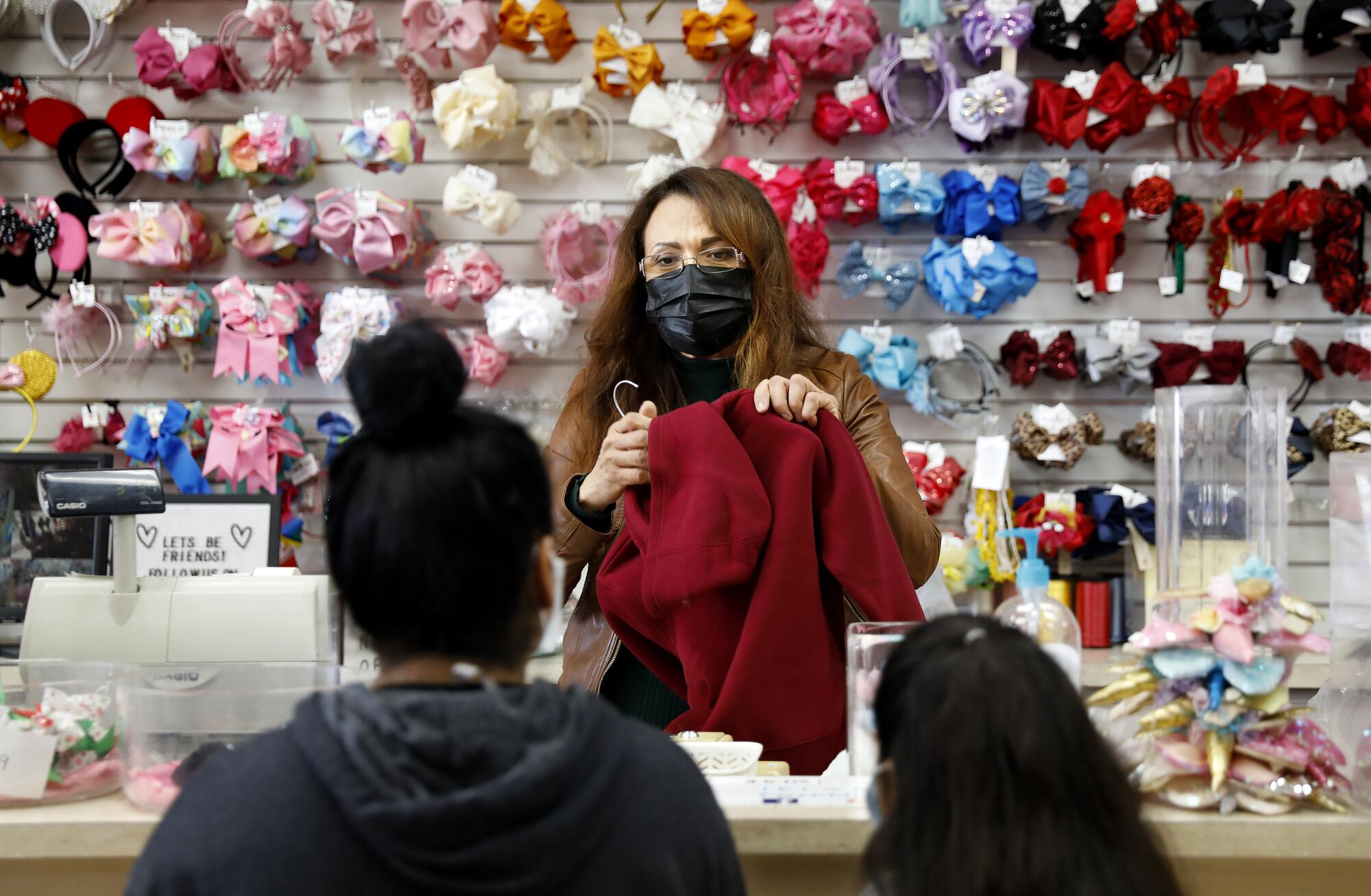
She decided that her future lay in following her family’s entrepreneurial spirit. It wouldn’t be easy or without risks.
But the pandemic made her realize that a seemingly stable job could evaporate. She needed to take a chance, for the possibility of a greater reward.
“The pandemic has sobered me in many ways,” she said. “If I really want to ‘make it’ in this society, I’m going to have to create my own path and create my own jobs for myself, because I don’t have a cushion.”
In the summer, Ilianna and her sister started a marketing business creating brand logos and websites. She charged about $400 each, knowing firsthand that many small Latino-owned businesses couldn’t afford much more.
She planned to get her MBA, to strengthen her skills as a future business owner.
In the meantime, she had landed a job in marketing at an Anaheim manufacturing company. Her side hustles were on the back burner, but they were on her mind.
She was moving toward something, even if she wasn’t sure exactly what.
More to Read
Sign up for Essential California
The most important California stories and recommendations in your inbox every morning.
You may occasionally receive promotional content from the Los Angeles Times.

